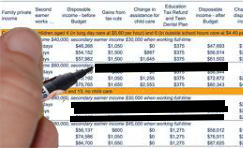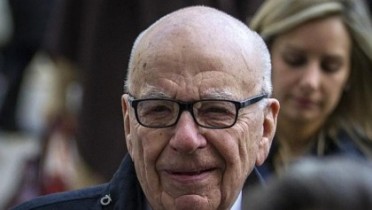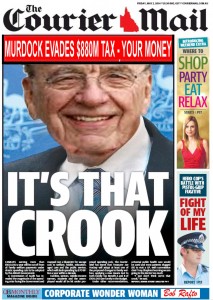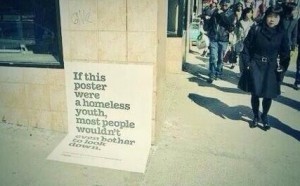
The 2014 budget omitted the table of adjusted family outcomes that had been in every previous budget since 2005. The analysis was done by treasury and available for inclusion but that it was not there indicates it was deliberately omitted. The figures went to Cabinet, so they were fully aware of the allegedly inequitable outcomes. Was it omitted for political reasons? The Coalition and its budget already have a problem with the public believing (and increasingly, and justifiably so) that it is unfair. Long-term observers have held the suspicion that the Coalition governs for its mates, the well-to-do, the elite, the born-to-rule set, and nothing in the budget, nor the Coalition’s rhetoric and off-budget policies since, have given cause to doubt this. For just a few examples, consider:
- University FEE-HELP changes to impact disproportionately on poor graduates
- A permanent hit to pensions and welfare vs. a short-term levy for the rich
- The $7/visit co-payment for GP visits (the well-to-do might complain over a copayment but it is the poor who will simply stop going.) This might also reduce rates of vaccination in Australia, putting the whole country at greater risk.
The perception that the budget is unfair is widespread and even having an effect on business support for the Coalition’s policies. Could the Coalition cope with further documents showing that the poor would pay disproportionately for the Coalition’s fictitious “budget repair process”, and that the Coalition knew about it and went ahead anyway?
Fairfax and other outlets have sought this information, and failed to receive it. Accordingly they and other analysts have done their own sums on the basis of published figures. The analysis confirms that the poor will be harder-hit than the wealthy.
Joe Hockey has been up in arms about Fairfax publishing this analysis. “It doesn’t tell the whole story,” he says. “It doesn’t reflect the fact that the rich pay more tax, and that the taxes of the average wealthy person pay the social support for an average four recipients of welfare.” Fairfax’s reporting “failed to take account of the higher rate of income tax already paid by higher-income households”. “Fairfax reporting has been malevolent,” he says.
Let’s pause for a moment and consider Hockey’s reported statements on the issue of equality, tax and welfare.
“In fact, just 2 per cent of taxpayers pay more than a quarter of all income tax. Maybe these taxpayers would argue that the tax system is already unfair.” “The average working Australian, be they a cleaner, a plumber or a teacher, is working over one month full time each year just to pay for the welfare of another Australian.” http://www.abc.net.au/news/2014-06-11/hockey-tries-to-set-straight-perception-budget-is-unfair/5516718
What does this say about Joe Hockey’s fundamental concept of social welfare? In a nutshell, it suggests that he is either beholden to, or at least panders to, selfishness. In Hockey’s world, it is portrayed as a bad thing that people with resources assist those without. This is a profoundly anti-charitable approach.
Our society has put in place progressive tax systems, effective social welfare structures and a range of subsidies, payments and tax breaks in an ongoing and long-term attempt to find a comfortable middle ground, where the privileged can continue to prosper whilst the downtrodden are assisted to keep their heads above water. Obviously Mr Hockey, and the Coalition, believe that the middle ground has trended too far in one direction. The problem is that society as a whole does not appear to agree with them.
Of course higher income households pay more tax. That’s the whole point of a progressive tax system. To argue that it’s justified to penalise low income workers more because they pay less tax is an attack on the very principle of the sliding scale. That’s an ideological position and it’s a valid choice, but it should be understood as such. Penalising more or less on the basis of tax rates entails an effective change in those rates. In other words, arguing that you can implement changes that hurt the poor more than the rich because the rich already pay more tax, is effectively arguing for a tax cut for the rich, or an extra tax for the poor, depending on how you want to look at it, and it is in no way an equitable outcome.
Let’s take a step backwards and approach this differently. Assume that every Australian is going to pay the maximum $844/pa as a result of the 2014 budget. Now you start handing some of that money back in concessions. $50 to this group, $100 to that, $327 to the top bracket. Why do you do this? Because they’re already paying a lot of tax. You are levelling the playing ground. You are moving closer to a situation where everyone pays the same amount of tax. This is the opposite of a progressive tax system.
Malevolent: adj. “Wishing evil or harm to another or others.” With his 2014 budget, Mr Hockey is seeking to specifically do harm to those who belong to a different socioeconomic class than himself. Now who’s being malevolent?
Yes, Mr Hockey, the 2014 budget is indeed unfair. It does increase inequity. You’ve known it since well before the budget was announced. And the way you’re talking about it, and responding to the questions about its unfairness, seems to indicate that the unfairness is quite deliberate. I’m not entirely sure that’s the message you were trying to achieve.

 The Australian tax system has been designed with its current rates to generate sufficient tax revenue to help meet Australia’s many needs. Yet you, Mr Murdoch, are our country’s greatest risk as you endeavor to avoid paying your share of this tax. This all adds up to not only derailing our economy but denying services to any number of Australians.
The Australian tax system has been designed with its current rates to generate sufficient tax revenue to help meet Australia’s many needs. Yet you, Mr Murdoch, are our country’s greatest risk as you endeavor to avoid paying your share of this tax. This all adds up to not only derailing our economy but denying services to any number of Australians.













